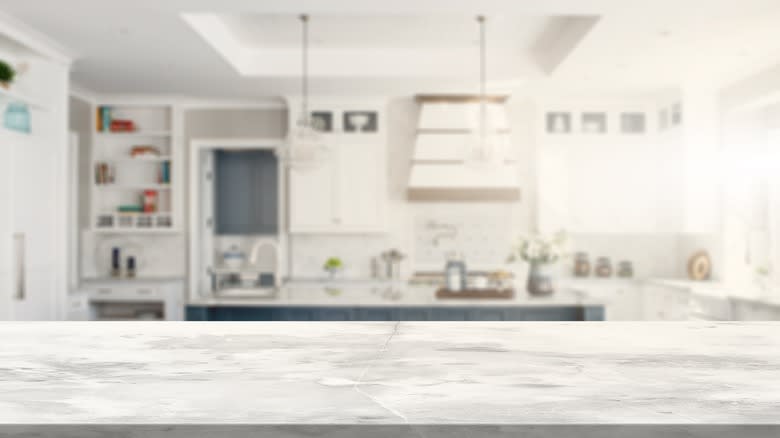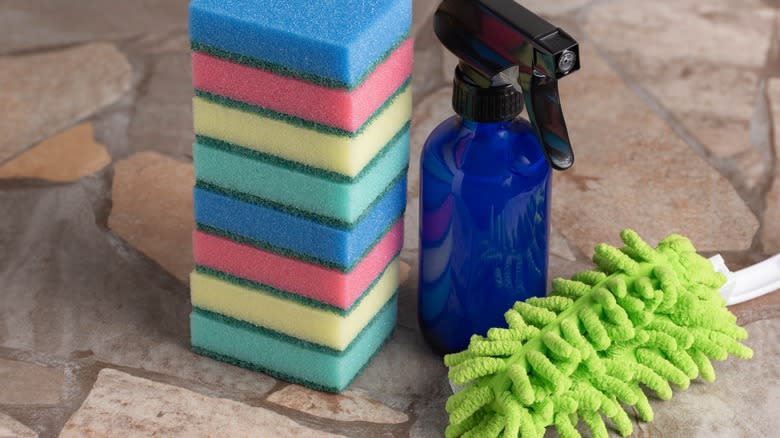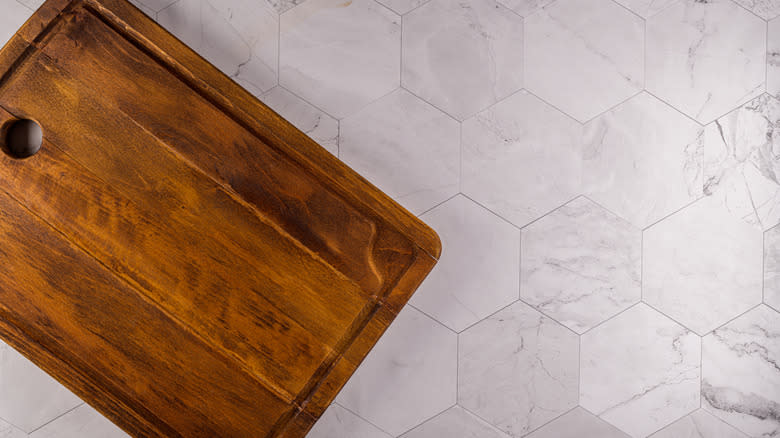Expert-Approved Tips For Keeping Your Kitchen Stone Countertops As Good As New

While laminate kitchen countertops are pretty forgiving, if you've got a beautiful granite, marble, or other type of stone counter, you know that's not the case. Stone can easily get marred, leaving your kitchen looking like it's been through the wringer and needing costly repairs. Thankfully, you can follow some easy steps to keep them pristine.
CEO and Owner of Proslit Tile & Stone, Irakli Khizanishvili, gave us some exclusive insights into how to keep your countertops looking like they did the day you first installed them. He said that often the damage to stone counters comes about from unexpected-yet-easily-avoidable occurrences.
"The most common ways [of damaging stone counters] include using harsh chemicals, such as bleach or ammonia, which can etch the stone; placing hot pots and pans directly on the surface without protection; and allowing acidic substances like lemon juice or vinegar to sit on the countertop, which can cause stains and etching," Khizanishvili explained.
Read more: The Best Way To Clean That Nasty Grease Off Of Your Kitchen Cabinets
Avoiding Stains And Chemical Damage

If you want to avoid stains, Irakli Khizanishvili said that it's critical to "clean spills immediately with a soft cloth." The faster you clean the spill, the less time the substance has to stain the material. The reason behind this is that one of the biggest issues with using marble for your kitchen countertops (and some other types of stone) is that it's a porous material, which absorbs liquids and causes those stones to set in and become permanent. At the same time, using a soft cloth, as opposed to a sponge or tougher material, helps prevent you from scratching and further damaging the stone as you clean it.
Khizanishvili also explained that specific cleaners are key for avoiding damage, particularly chemical damage to the stone. "I recommend using a pH-neutral cleaner specifically formulated for stone surfaces," he noted. "This method is best because it effectively removes dirt and grime without damaging the stone's sealant or causing etching." And speaking of sealant and etching, he adds that it's important to "regularly seal your countertops to protect them from stains and etching." Sealant fills in the pores in your stone countertop, which is why it helps keep these issues from occurring.
It's not just the chemicals you use, either. The best way to clean your marble and other stone countertops involves blotting rather than wiping. Using this method can help you steer clear of accidentally spreading damaging substances around your countertop and worsening the stain.
Preventing Scratches And Heat Damage

Beyond stains and chemical damage, heat damage can also ruin your countertops. This occurs when you set hot cookware or plates directly on the stone, which can damage the sealant on the countertops and create burn marks. "To avoid damage, always use trivets or hot pads under hot cookware," Irakli Khizanishvili advised.
He also mentioned that besides heat damage, scratches are another issue to avoid. Using cutting boards, as opposed to slicing food directly on your counter, can also help keep your counters looking good. When you cut straight onto the counter, your knife can chip away at the protectant sealant on it, which can make stains and abrasions much more likely.
Ultimately, these are important tips you need to know before putting granite counters or stone versions in your kitchen so that your counters will last for a long time and continue to look new.
Read the original article on The Daily Meal.

 Yahoo Lifestyle
Yahoo Lifestyle 
